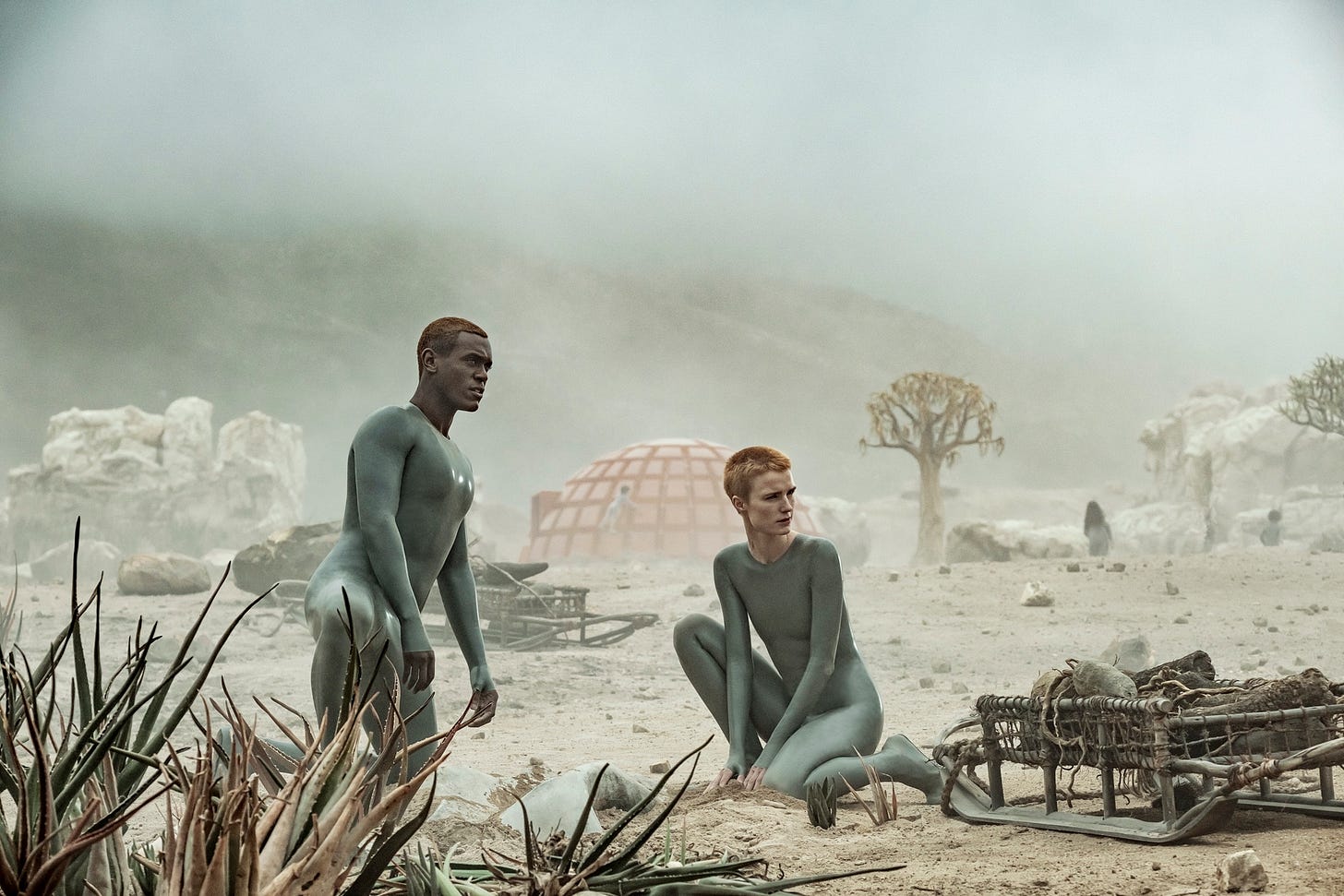
Image Credit: Netflix
Welcome to the latest edition of Weekend Watch, in which I recommend (or occasionally warn against) movies or TV shows I’ve been checking out. This week, Hilary Swank heads to Mars and androids raise kids on a more distant planet.
Shows about NASA astronauts and their families have very much been in fashion for the last few years – there are various series about space voyagers blasting from Earth on missions and the emotional fallout of their choice to spend time away from their homes and their home planet. Away falls squarely into that genre. Hilary Swank plays Emma Green, commanding the Atlas mission, comprised of space explorers from different nations, aiming to land on Mars.
Away splits its time between the mission (space is a dangerous place, with sudden fires and malfunctions aboard the ship) and the home lives of the various crewmembers. For Emma, that’s husband Matt (Josh Charles), a NASA hotshot who had been in line to lead the mission before medical issues sidelined him and daughter Alexis (Talitha Eliana Bateman). On board, there is also Vivian Wu as Lu, a conflicted Chinese chemist, Ray Panthaki’s ebullient surgeon Ram, Mark Ivanir’s veteran Cosmonaut Misha, and Kwesi (Ato Essandoh), a nervy Ghanaian/British botanist who has never been in space before, tasked with growing plants on the Red Planet (someone call Matt Damon’s Mark Watney!)
The series slowly fills in the details of the various family and friend connections/dramas of the main characters – Emma’s is naturally front and centre, but everyone has their issues. It’s here that the show suffers a little: while several of the stories land (Lu’s is compelling and nuanced), others come out of the Big Book Of Emotional Drama, which is especially disappointing given the pedigree of some of the producers, including Friday Night Lights/Parenthood’s Jason Katims. Add to that some startlingly obvious needle drops, including Rocket Man. What next, Life On Mars?
As for the sci-fi side of things, Away makes a better stab of it, with effects that range from incredibly effective to visibly wonky. The crew dynamics on the ship are interesting, a much more conflicted bunch than your usual brand of straight-ahead NASA heroics. Not to mention that some disagreements could kick off an international incident.
If some of the drama is a little airless (no pun intended), Away still draws you back in, interested to see how each of the crew’s backgrounds impact their task. And how they fare on their dangerous quest to reach further than humanity has in the past. It might not quite be The Right Stuff, but it has some of that spark.
Away is on Netflix now. I’ve seen the first three episodes.

Image Credit: HBO
Raised By Wolves is a very different science fiction proposition. Created by Prisoners screenwriter Aaron Guzikowski, the marquee name here is Ridley Scott, one of the modern masters of the genre. With a back catalogue that includes Alien, Prometheus, Blade Runner, The Martian in his long cinematic career, this series also marks his return to regular TV directing for the first time since the 1960s. While his name is on a huge list of series as producer, here he sets the visual tone for the show, handling the first two episodes of this ambitious drama.
Set in a much more striking future than Away, Wolves finds humanity on the brink of extinction, the result of a catastrophic holy war between atheists and believers that feels all too possible in our fractious political climate. The religious forces have sent an ark, called Heaven, full of cryogenically snoozing colonists to the distant, barely habitable a planet of Kepler 22-b. The atheists, on the other hand, beat them to it, sending faster ships crewed by androids and carrying frozen embryos to repopulate the series. Which sets the stage for conflict, but nothing plays out quite the way you expect.
Scott revisits some of his trademarks here – the atheist androids Father and Mother raising the kids (convincingly and stylishly brought to life by Abubakar Salim and particularly Amanda Collin) leak a familiar milky fluid when damaged or overloaded – and the whole aesthetic is monochrome tomes and billowing plumes of smoke or fog, and the series clearly had a huge budget for its effects. So when Mother goes on the warpath to protect her young, the scenes are shockingly violent. Among the humans, Vikings’ Travis Fimmel makes the most impact, carving out an atheist character with compassion and steel in one.
And yet this has faults too – some of the religious overtones are less subtle than a brick to the face, and the show never quite recaptures the scope and drive of the initial Scott-made episodes. The series is also singularly arch, which can create real distance between the audience and the story, lessening any emotional impact. As for the children, they rarely register as characters beyond Winta McGrath’s Campion and one or two others.
Wolves is to be lauded for being a mostly original concept, and for truly committing to tackling religious conflict in a time when that could turn so many viewers off. And I’m glad that Scott is bringing his considerable talents to the small screen again. My advice, though? Watch beyond the first two episodes to really decide if this is something you want to commit to. Oh, and don’t necessarily look to the show for parenting tips. Mars ain’t the kind of place to raise your kids. And Kepler 22-b is no walk in the park either…
Raised By Wolves has three episodes on HBO Max; new episodes premiere weekly. I’ve seen the first three episodes.


